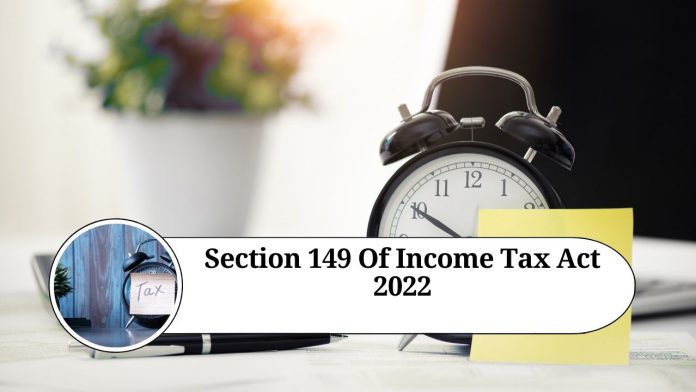The Income Tax Act of 2022 is a crucial tax legislation in India, which governs the taxation of income for individuals, companies, and other entities. Section 149 of the Income Tax Act 2022 lays out the provisions for filing income tax returns in India.
The purpose of this article is to provide a comprehensive guide to Section 149 of the Income Tax Act 2022, including the individuals and entities that need to file tax returns, the due dates for filing returns, and the consequences of non-compliance.
Who needs to file income tax returns?
As per Section 149 of the Income Tax Act 2022, any individual or entity that earns taxable income in India is required to file an income tax return. Taxable income includes income from salaries, business or profession, capital gains, and other sources of income.
The following individuals and entities are required to file income tax returns under the Income Tax Act 2022:
- Individuals: Any individual whose total income exceeds the basic exemption limit of Rs. 2.5 lakhs in a financial year is required to file an income tax return.
- Companies: All companies, including private and public limited companies, are required to file income tax returns regardless of whether they have made profits or losses.
- Partnership firms: Partnership firms are also required to file income tax returns, regardless of whether they have made profits or losses.
- Limited Liability Partnerships (LLPs): LLPs are also required to file income tax returns, regardless of whether they have made profits or losses.
- Trusts: Any trust that earns a taxable income in India is required to file an income tax return.
- Association of Persons (AOPs) and Body of Individuals (BOIs): AOPs and BOIs are also required to file income tax returns if they earn taxable income.
Due Dates for Filing Income Tax Returns:
The due date for filing income tax returns depends on the category of the taxpayer. The following table outlines the due dates for filing income tax returns under the Income Tax Act 2022:
| Category of Taxpayer | Due Date for Filing Income Tax Return |
|---|---|
| Individuals, HUFs, and AOPs | 31st July of the assessment year |
| Companies and LLPs | 30th September of the assessment year |
| Tax Audit Cases | 30th September of the assessment year |
| Transfer Pricing Cases | 30th November of the assessment year |
Consequences of Non-Compliance:
Failing to file income tax returns or filing returns after the due date can lead to various consequences under the Income Tax Act 2022. Some of the consequences of non-compliance are as follows:
- Penalty: If an individual or entity fails to file income tax returns on or before the due date, a penalty of Rs. 5,000 may be levied.
- Interest: If the tax liability is not paid by the due date, interest will be charged under Sections 234A, 234B, and 234C of the Income Tax Act 2022.
- Prosecution: Non-compliance with income tax regulations can lead to prosecution under the Income Tax Act 2022.
Conclusion:
In conclusion, Section 149 of the Income Tax Act 2022 lays out the provisions for filing income tax returns in India. All individuals and entities that earn taxable income in India are required to file an income tax return. The due date for filing returns depends on the category of taxpayer, and failing to file returns or filing returns after the due date can lead to various consequences under the Income Tax Act 2022.
Individuals and entities need to comply with the provisions of the Income Tax Act 2022 to avoid penalties, interest, and prosecution. It is recommended that taxpayers seek the assistance of tax professionals to ensure that their tax returns are filed correctly and on time. By following the provisions of the Income Tax Act 2022, taxpayers can contribute to the growth and development of the country by paying their fair share of taxes.
Read more useful content:
Here are some frequently asked questions (FAQs) regarding Section 149 of the Income Tax Act 2022:
Q: Who needs to file an income tax return as per Section 149 of the Income Tax Act 2022?
A: Any individual or entity that earns a taxable income in India is required to file an income tax return. This includes individuals, companies, partnership firms, LLPs, trusts, AOPs, and BOIs.
Q: What is the due date for filing income tax returns under Section 149 of the Income Tax Act 2022?
A: The due date for filing income tax returns depends on the category of taxpayer. Individuals, HUFs, and AOPs need to file returns by 31st July of the assessment year, while companies and LLPs need to file returns by 30th September of the assessment year.
Q: What are the consequences of non-compliance with Section 149 of the Income Tax Act 2022?
A: Non-compliance with Section 149 of the Income Tax Act 2022 can lead to penalties, interest, and prosecution. If an individual or entity fails to file income tax returns on or before the due date, a penalty of Rs. 5,000 may be levied. Interest will also be charged if the tax liability is not paid by the due date. Non-compliance with income tax regulations can lead to prosecution under the Income Tax Act 2022.
Q: Is it necessary to file income tax returns even if there are no taxable income or losses?
A: Yes, it is necessary to file income tax returns even if there are no taxable income or losses. This is to comply with the provisions of the Income Tax Act 2022.
Q: What is the penalty for late filing of income tax returns?
A: If an individual or entity files the income tax return after the due date, a penalty of Rs. 5,000 may be levied under Section 234F of the Income Tax Act 2022.




















